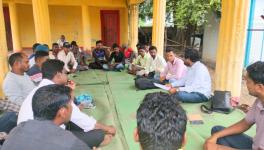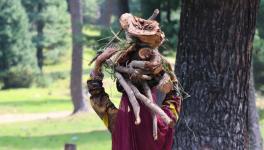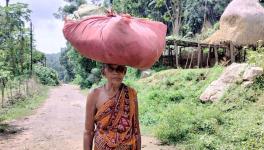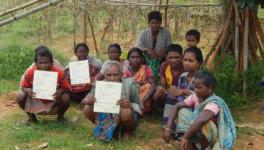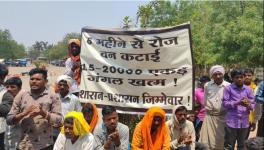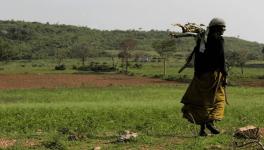TN: Generations Down the Line, Kanyakumari’s Kani Tribes Still Await Land Titles Under FRA
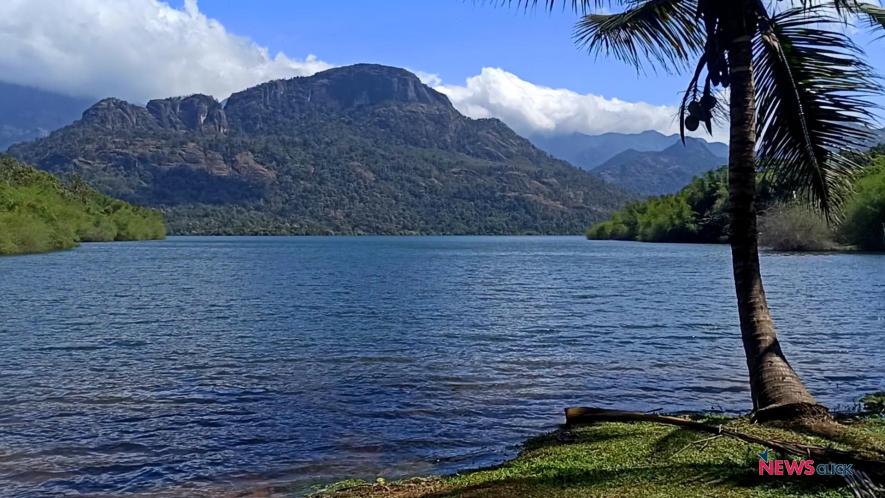
The Thachamalai settlement in the mountain seen at the far end is reachable from Pechiparai in about 20 minutes of a boat ride across the Pechiparai dam.
Chennai: Kanyakumari is home to around 7,000 ‘Kani’ or ‘Kanikar’ tribes living near the Western Ghats. Even after dwelling in the forest for several generations, this Scheduled Tribe (ST) community is yet to receive legal entitlement over the land they possess.
Further, the huge slack in implementing the Scheduled Tribes and Other Traditional Forest Dwellers (Recognition of Forest Rights) Act, 2006 (FRA) and neglect from successive governments and intimidation from the forest department have left the community in dire straits.
The Tamil Nadu Preservation of Private Forests Act, 1949 and the announcement on tiger reserves have also dealt a severe blow to the economic sustainability of this tribal community in Kanyakumari.
Several facilities are yet to reach a bulk of the tribal population, such as quality education, healthcare, roads and electricity. People still live in small huts made of raw clay bricks, walls made of bamboo sticks and roofed with straws or plastic sheets.
‘ONCE NOMADIC, NOW SETTLED’
The Western Ghats region in Kanyakumari, including Pechipparai, Kadayal, Arukani and Pathukani, is home to the Kani tribes. The Kanis also live in the ghat regions of Tirunelveli district in Tamil Nadu and Thiruvananthapuram and Kollam districts in Kerala.
As per the 2011 Census, around 7,200 Kani tribes live in different mountain areas in Kanyakumari, of which 3,700 are women, and 3,500 are men. There are two divisions based on endogamy and exogamy in the community with five subdivisions, each called ‘Illams’.
Once a nomadic tribe, the community now does not migrate from one place to another. With agriculture being the principal occupation, they once cultivated all eatables independently but are now forced to buy from the markets. Sheeba, who lives in the Thachamalai settlement in Pechiparai village, said the market would be filled with goods they cultivated.
Sheeba, her husband and their son studying at a polytechnic live in this hut close to the Pechiparai dam.
“We used to cultivate and sell banana, tapioca, areca nut and different types of millets in the market. Now we are buying from the markets after several regulations prevented us from cultivating in the hills,” she said.
SHIFT TO RUBBER CULTIVATION
Apart from agriculture, the Kani tribes collected honey from the forest regions and cultivated other minor forest produce. This helped them in earning some money to cater for their needs. After the implementation of several regulations in the forest areas after 1991 and the increasing population of wild animals, agriculture took a backseat.
“The wild animals, including monkeys, wild boars and elephants, destroy the crops, so we were forced to cultivate rubber trees in the land under our possession,” Sheeba said.
Rubber plantations along the western ghats in tribal settlements in the Pechiparai area.
The tribal community also accuses the forest department of pushing for the safety of animals in the forest, not humans living there.
K Ragu, district secretary of the Tamil Nadu Tribals Association (TNTA), said: "For the government and forest department, the wild animals are a priority. Human lives are less important amidst the threat of elephant attacks in the area."
The community's survival is now solely dependent on income from rubber plantations and daily wages. Since the localities receive rain for most of the year, the income now is limited.
Chandrika, who has studied up to Class IX, takes up all available jobs to feed her only daughter.
"I used to get a job for less than two weeks a month at a daily wage of Rs 400 to Rs 450. The jobs include planting saplings, cleaning grounds and harvesting pepper," she said. The wage disparity continues, as men are paid around Rs 800/day.
Chandrika lives in this sheet roofed house with dimensions 20*20 feet along with her husband and four-year-old girl child.
The tribals believe that releasing animals captured from nearby areas has led to increased human-animal conflicts.
“Instead of releasing the animals captured in the deep forests, the forest officials release them in areas closer to the settlements. This is another problem now facing us,” Ragu said.
Conditions of the roads remain pathetic in most settlements, with few exceptions of concrete roads.
Though several villages are accessible by road, it takes a few hours to reach Pechiparai, the nearby town. Most roads in the settlements are poorly maintained, while few stretches have concrete roads. The tribals take motorised boats to reach the hamlets or settlements, the easy way to access.
ATROCITIES OF FOREST DEPARTMENT
Building a proper roofed house and toilets remains a humongous task, as the forest department prevents the movement of bricks, metals, sand and even toilet closets into the forest area. Most houses remain thatch-roofed and bamboo walled with very few exceptions, while toilets are rare.
“This is our living place. This is the place our ancestors were born in and cultivated the land. Now, we are being prevented from taking basic essential materials for our needs. We are the true protectors of the forest, not the forest department or the government,” said Ragu.
The tribal community accused the forest department officials of high-handedness, intimidation and framing false charges against them.
Ragu questioned the rights of the forest department in controlling the tribals and said: “We will not leave our land, whatever intimidation comes against us. We will live here and protect the forest for good.”
The formation of TNTA has helped reduce the intimidation of forest department officials, and the tribals have a voice to speak for them.
FRA Gathering Dust?
A ray of hope arrived in 2006 when United Progressive Alliance (UPA) government, backed by the Left parties, ensured that the FRA was passed in Parliament. But, after one and a half decades, Tamil Nadu remains the worst performer.
“Even as we celebrate the 75th anniversary of our independence, the tribals are living under pathetic conditions. The legal titles for land under the possession have not been carried out effectively even as 16 states have implemented the FRA”, said SR Sekhar, state vice-president of TNTA.
Of the 42 Kani settlements in the Kanyakumari district, 50% of people live in Kadayal town panchayat, of which Sekhar has functioned as the president and is now elected as a councillor.
“The FRA clearly states that tribals who have been living in the forests up to December 13, 2005, and non-tribals living in the forests for 75 years/three generations as on December 13, 2005, should be given ‘title rights’. But in Kanyakumari, only 153 titles have been issued in the last 16 years,” Sekhar said.
The TNTA has accused the district administration of denying titles to the tribals for land in their possession.
“Now, the district administration is promising to provide titles only for the land in which our houses are located. This would come to around 5-10 cents, less than 1% entitled through the FRA. The TNTA is continuously fighting for the implementation and will wage intense struggles to ensure the act is implemented,” Sekhar said.
Kanyakumari district has a reserved forest area of 48,193.105 hectares (ha), of which 40239.55 ha has been brought under the Kanyakumari wildlife sanctuary.
“As per the private forest act, 2/3rd of the area in the district would become a private forest, including the rubber plantations. This will affect the livelihood of several thousand tribal people and others. It would be impossible to take yields from the forest, and selling the property would also be prevented. This Act should not be implemented in Kanyakumari,” Sekhar added.
The tribal communities face multiple challenges, with more emphasis given to protecting the environment and wildlife, pushing the safety and welfare of tribals to a lower down in priority. All the tribals are demanding is their rights, as provisioned by the Acts.
Images: R Prakash
Get the latest reports & analysis with people's perspective on Protests, movements & deep analytical videos, discussions of the current affairs in your Telegram app. Subscribe to NewsClick's Telegram channel & get Real-Time updates on stories, as they get published on our website.









